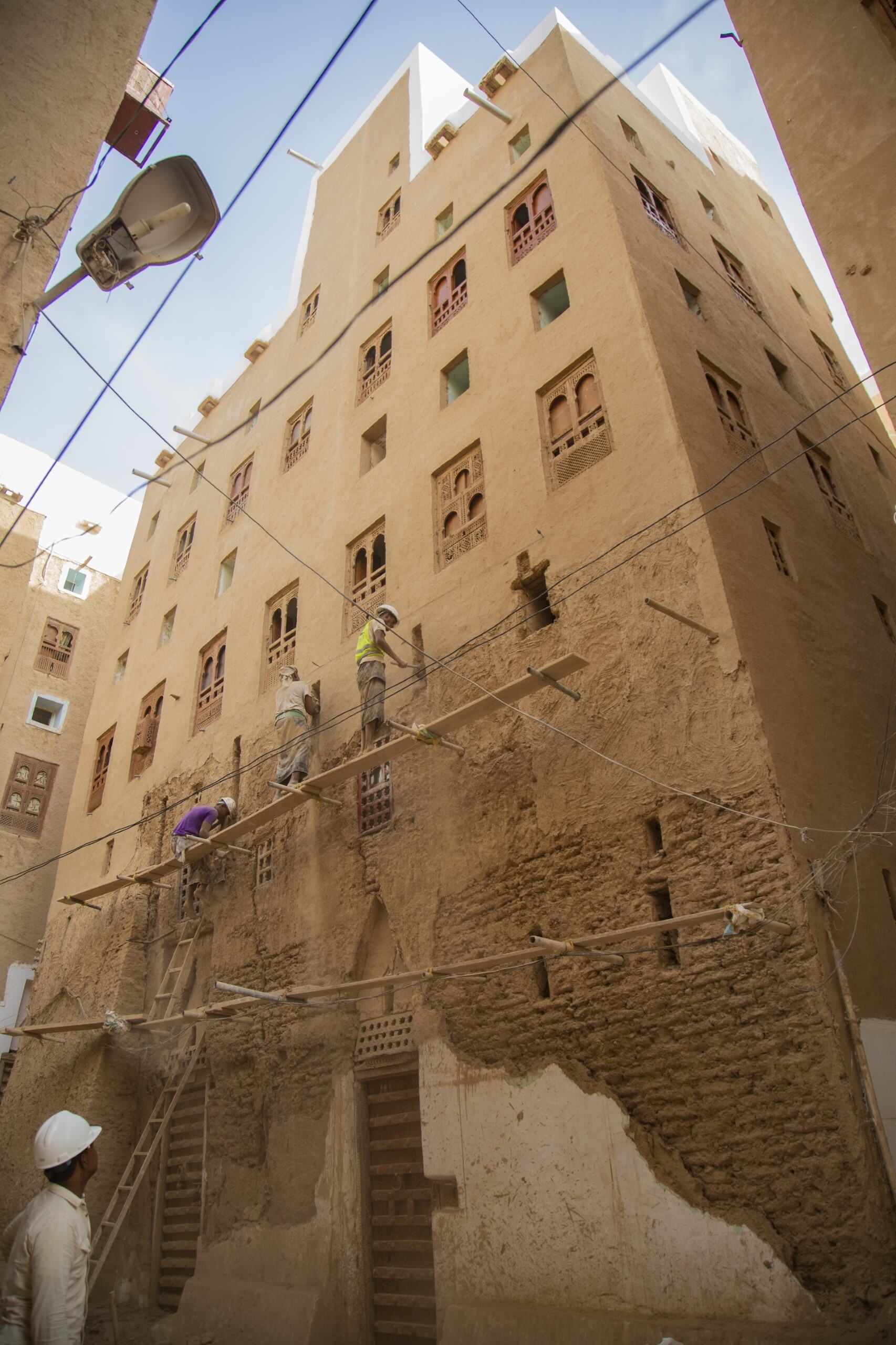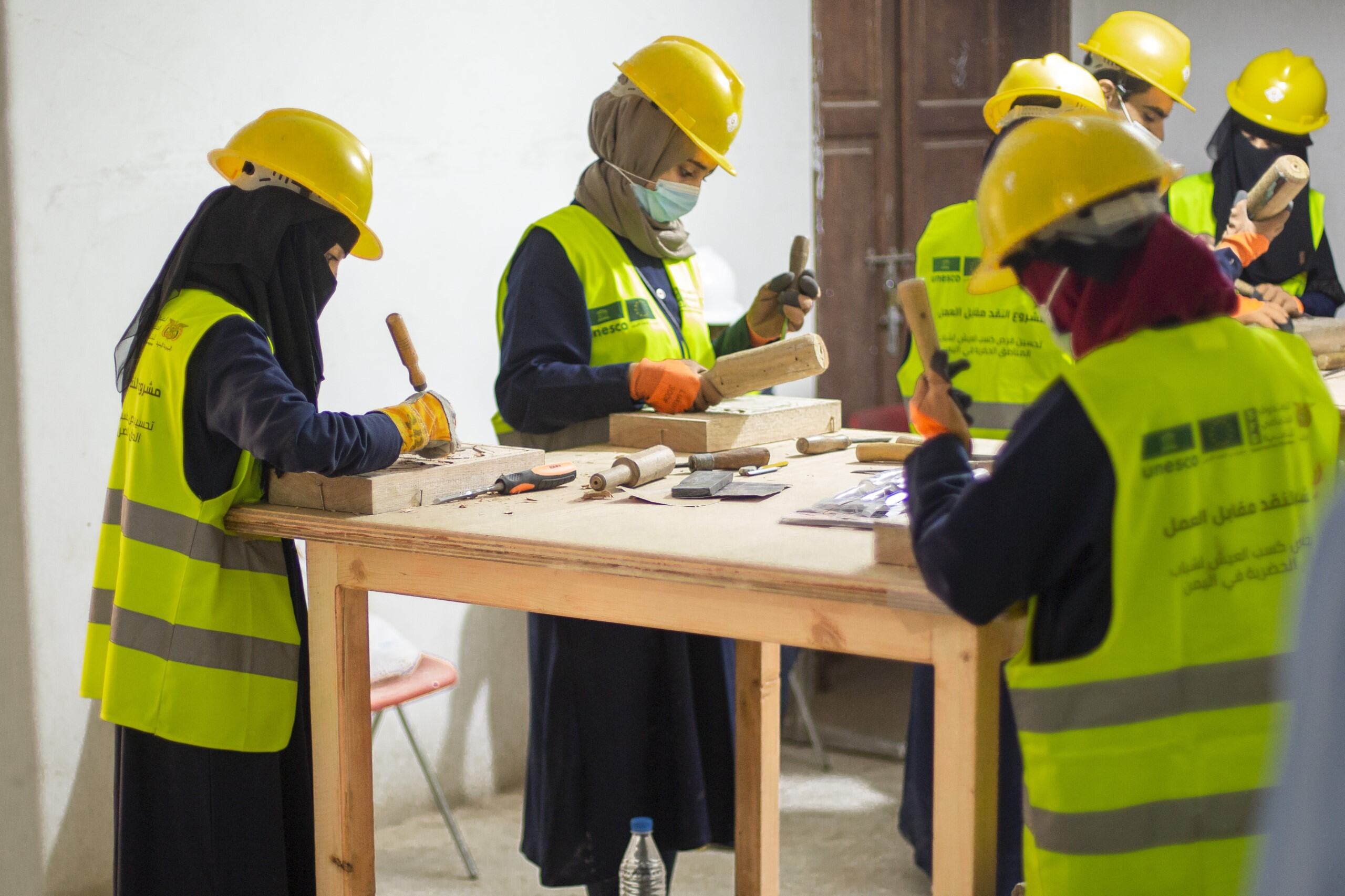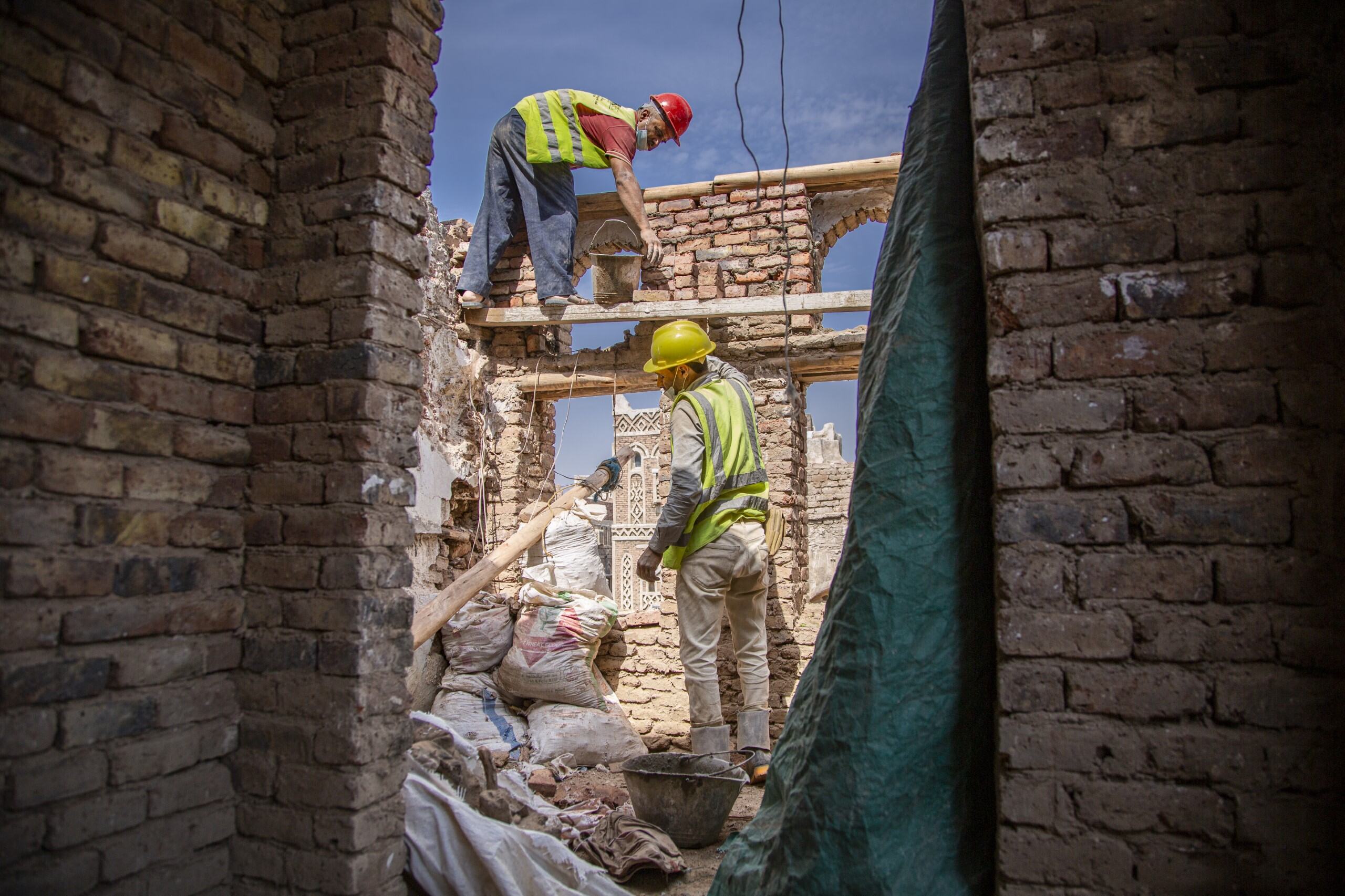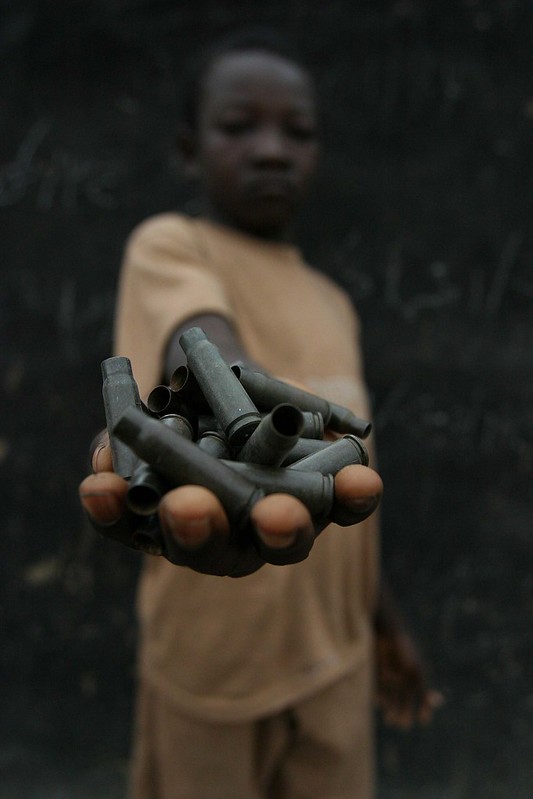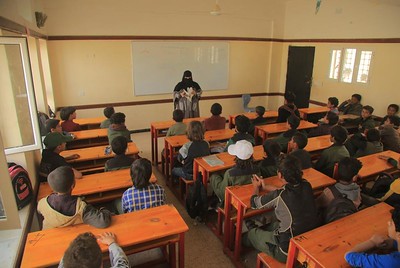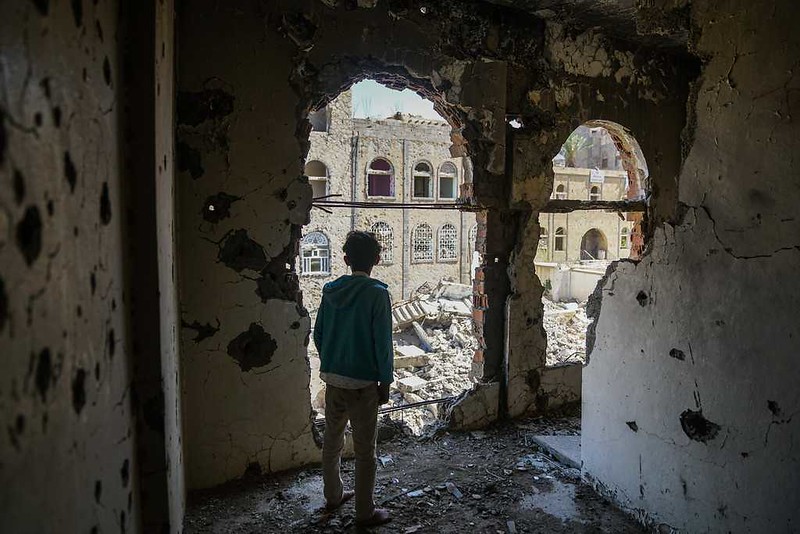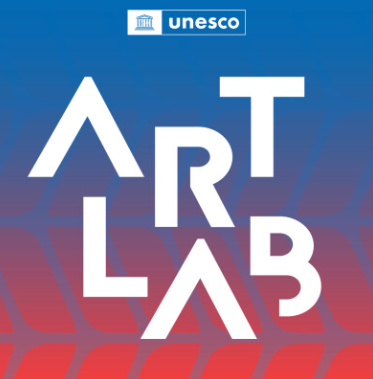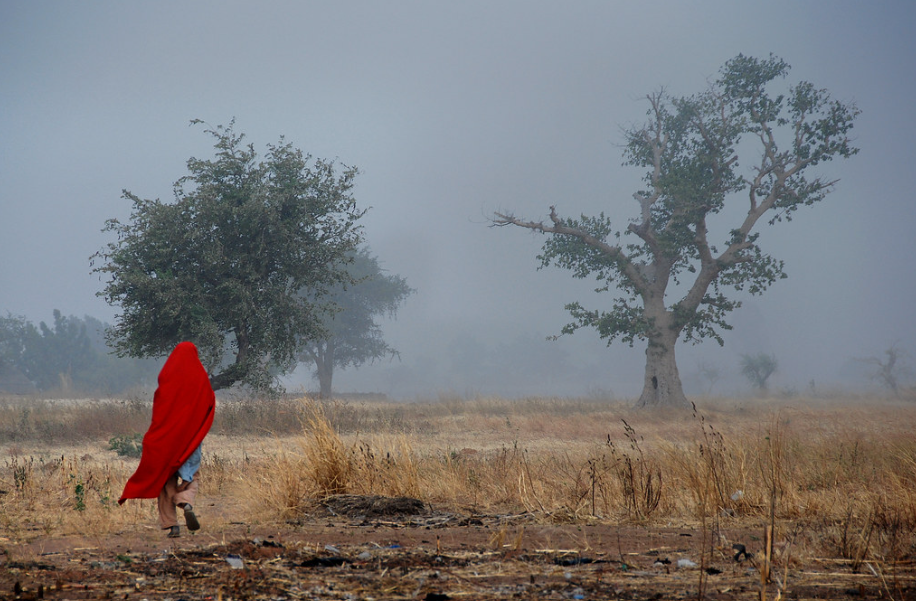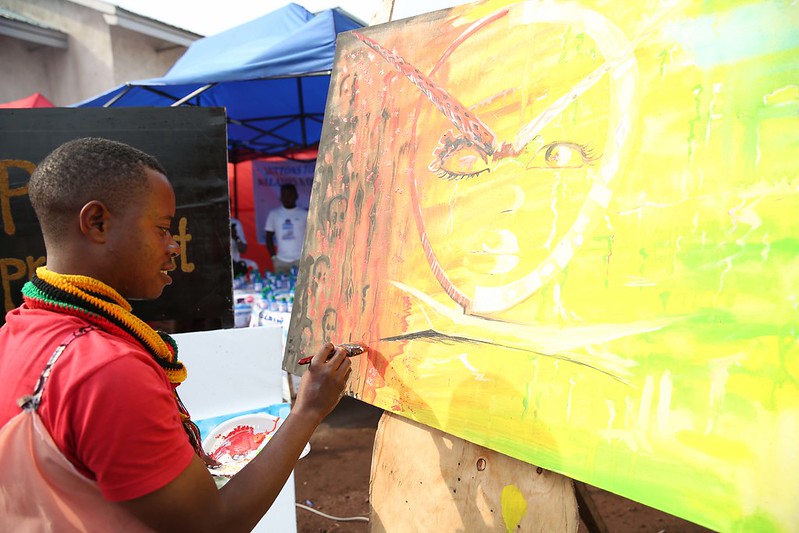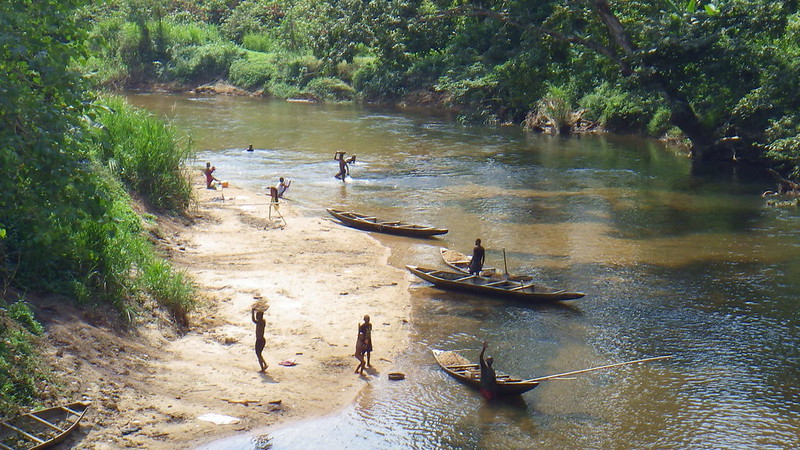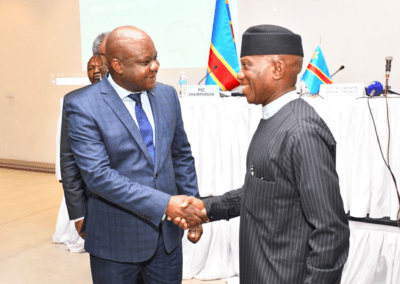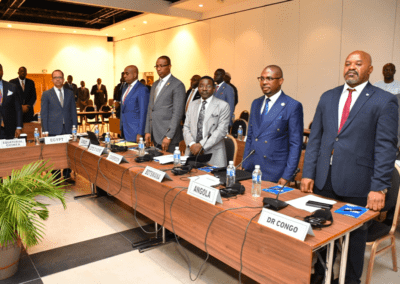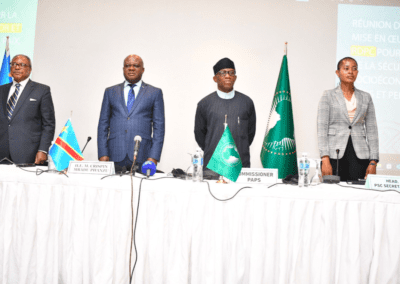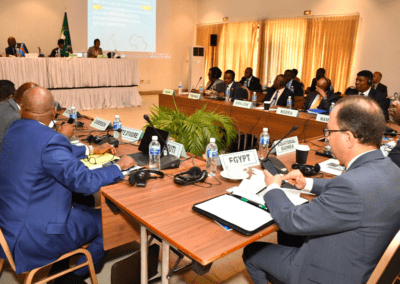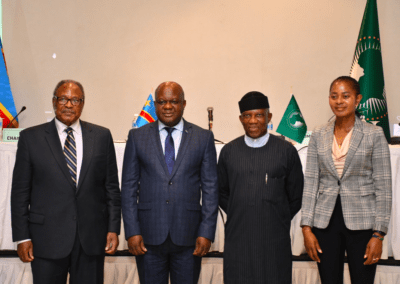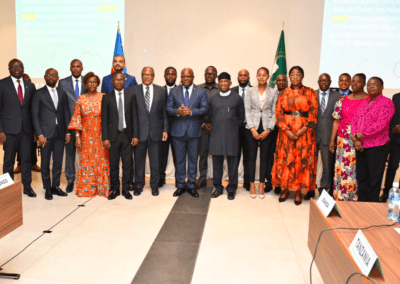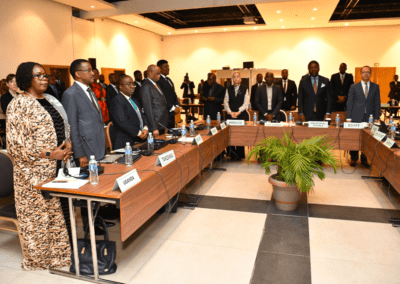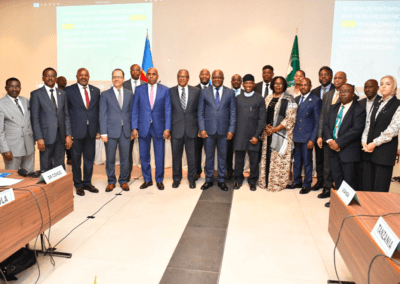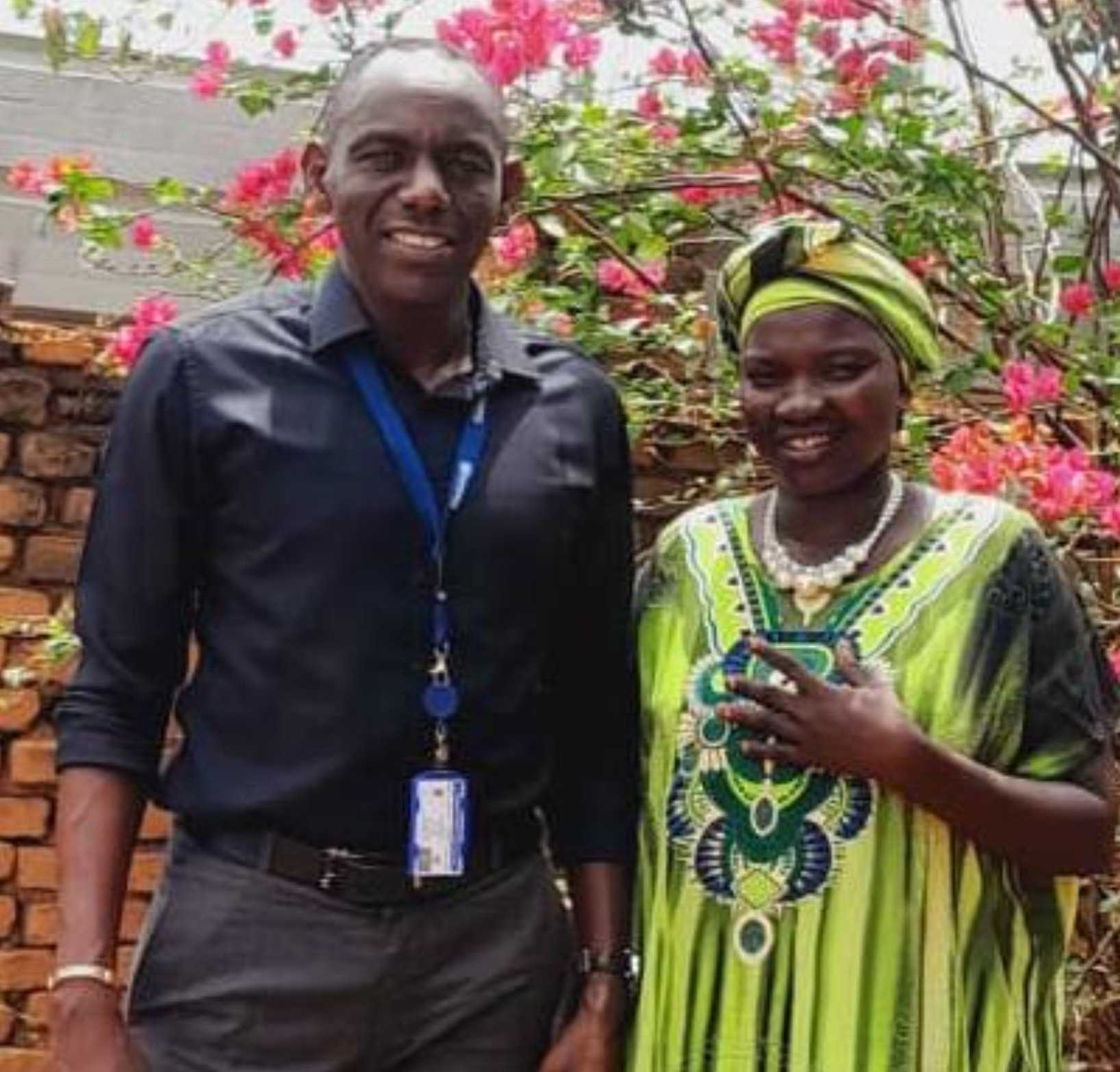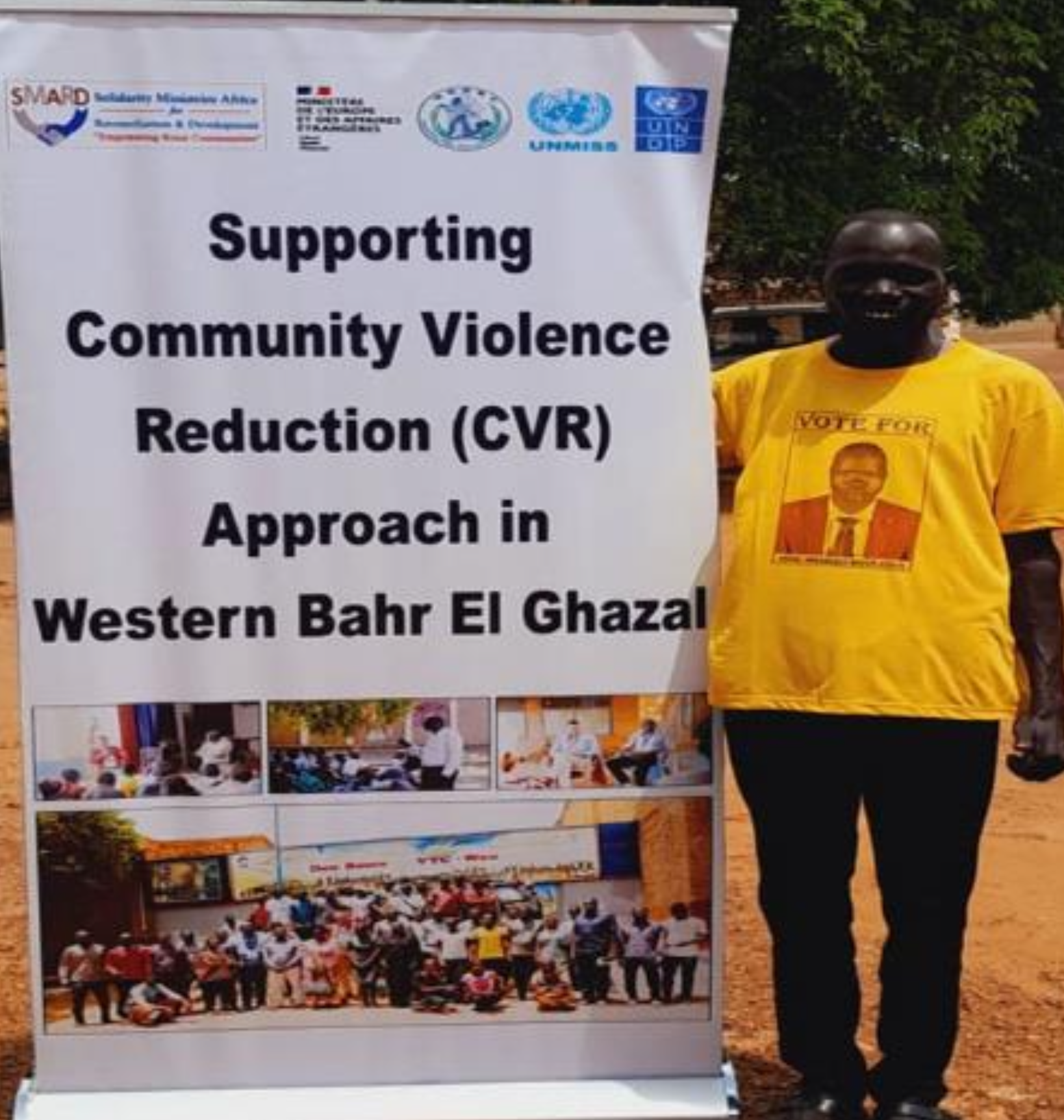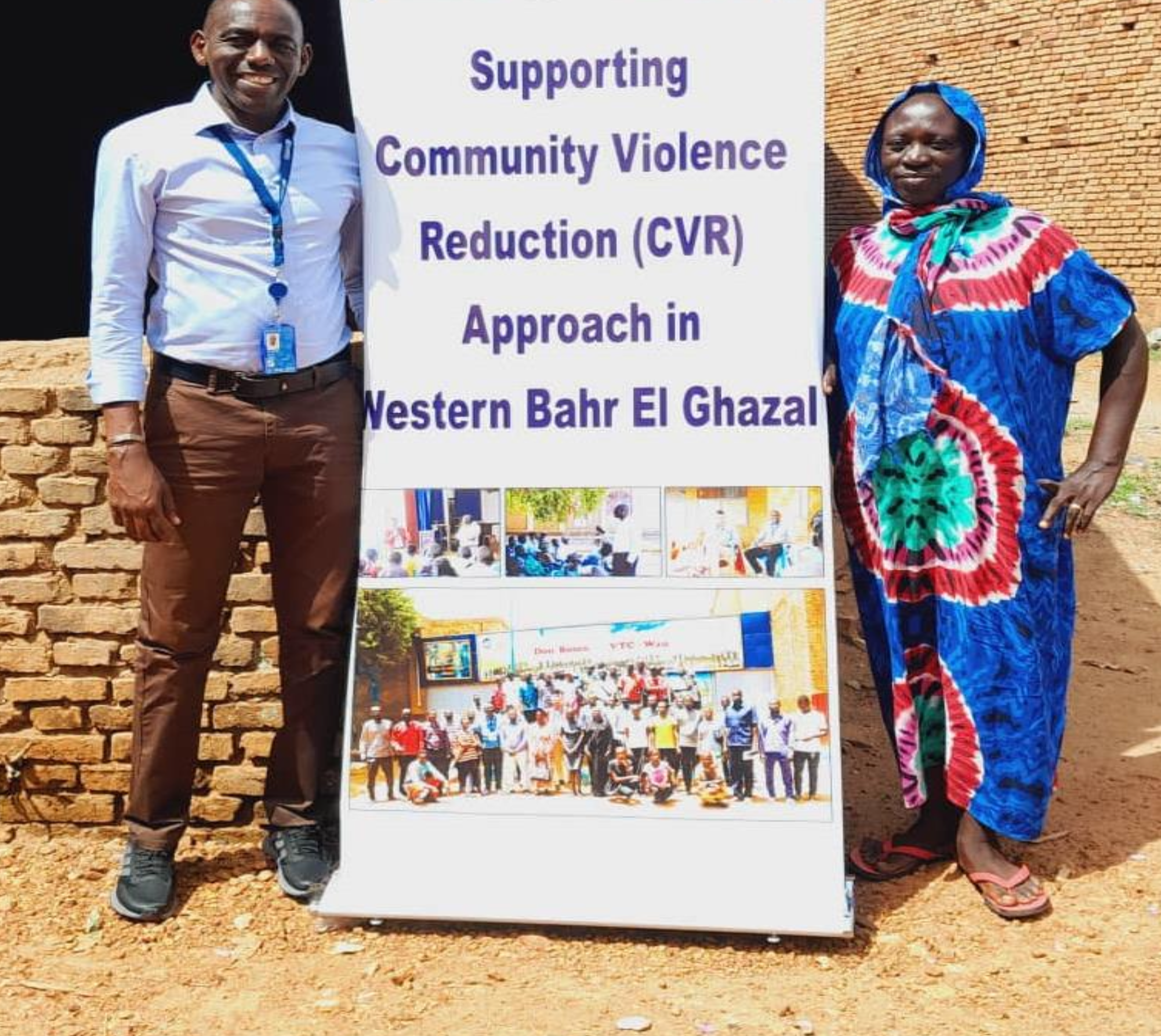The DDR Section extends its gratitude to the following key strategic partners. Their generous financial contributions play a vital role in enabling us to initiate and/or complete essential activities.
We would also like to express our gratitude to all members of the Group of Friends of DDR, co-chaired by Cote d’Ivoire and Egypt.
CONTENTS
KEYNote:
SRSG MINUSCA
1.
Introduction
2.
The Peacebuilding architecture review 2025
3.
Partnerships in focus: unesco
4.
peace & security council meeting
5.
DDR & political transfor-mation of armed gorups
6.
Mali – One year after MINUSMA’s withdrawl
7.
field updates
8.
recent Publications
9.
Upcoming Events and Trainings
In Focus: The politic of DDR & Sustaining peace
Keynote:
In this keynote address, Valentine Rugwabiza, Special Representative of the Secretary-General (SRSG) and Head of United Nations Multidimensional Integrated Stabilization Mission in the Central African Republic (MINUSCA), highlights the critical achievements of Community Violence Reduction (CVR) initiatives in the Central African Republic. She reflects on how these efforts are fostering sustainable peace, strengthening community resilience, and supporting long-term stability in the region.
Ms. Valentine Rugwabiza of Rwanda was appointed Special Representative of the Secretary-General for the Central African Republic (CAR) and Head of MINUSCA on 23 February 2022 by UN Secretary-General, António Guterres. With more than 30 years of experience in Africa development and security issues in both the public and corporate sectors, Ms. Rugwabiza has been a Cabinet member, a senior diplomat accredited to several countries and organizations, and a senior leader in national, regional and multilateral entities.
Since 2016, Ms. Rugwabiza has been her country’s Permanent Representative to the United Nations and non-resident Ambassador to Colombia and Jamaica. Between 2024 and 2016, she served as Minister for East African Community Affairs and Member of the East African Legislative Assembly. From 2013 to 2014, she was Chief Executive Officer of the Rwanda Development Board and a Member of Cabinet.
From 2005 until 2013, Ms. Rugwabiza served as the Deputy Director-General of the World Trade Organization (WTO) in Geneva. Before that, she was Rwanda’s Permanent Representative to the United Nations Office at Geneva and United Nations specialized agencies, as well as Ambassador to Switzerland, from 2002 to 2005.
Ms. Rugwabiza speaks English, French, Kiswahili and Kinyarwanda.
1. Introduction
Introduction
Beyond its reputation as a technical process, DDR is inherently political, shaping power dynamics and laying the groundwork for durable peace in fragile and conflict-affected settings. Located at the nexus of security, politics, and humanitarian support, DDR not only disarms combatants and reintegrates them into civilian life but is also influenced by and can influence broader political processes. For example, the mediation and negotiation process in a given country can have a direct influence on the national DDR program and architecture, shaped by the agreement reached and its DDR specific clauses. On the other hand, DDR tools can support armed groups to transform into legitimate political actors and address structural grievances. In this way, DDR can recalibrate power relations and support fostering a more inclusive governance and political environment. DDR, therefore, can become a crucial element in sustaining peace by directly influencing political processes.
However, today’s rapidly evolving conflict landscape — marked by fragmented armed groups, violent extremism, and cross-border dynamics — poses new challenges. UN support in these contexts, from Peacekeeping Operations to country teams, must adapt, and so must DDR. The 2025 Peacebuilding Architecture Review (PBAR) will offer a timely opportunity to take stock of the United Nations’ peacebuilding efforts and, crucially, to refine DDR’s role within the wider peacekeeping continuum.
In this edition, the bulletin delves into the politics of DDR and its expanding role in the peace continuum, spotlighting partnerships, innovations, and practical lessons from the field. It opens with a high-level reflection on the broader significance of DDR and CVR, featuring a keynote address by Valentine Rugwabiza, the Special Representative of the Secretary-General (SRSG) for the Central African Republic and Head of MINUSCA, and interviews with H.E. Ambassador Mohamed Edrees and Sara Pantuliano, both appointed as Independent Eminent Persons (IEP) for the PBAR (Chapter 2).
Next, the new “Partnerships in Focus” chapter showcases UNESCO’s unique contributions to CVR, illustrating creative approaches taken by partner organizations (Chapter 3). This leads into a regional discussion on DDR’s intersection with policies like the Post-Conflict Reconstruction and Development (PCRD) policy, reflecting on the African Union Peace and Security Council meeting in Kinshasa and its implications for peace, security, and prosperity in Africa (Chapter 4).
Chapter 5 introduces an ongoing collaboration between the Berghof Foundation and the DDR Section, which explores the intricate relationship between DDR and the political transformation of armed groups. A retrospective in Chapter 6 revisits former CVR projects in Mali, offering insights one year after the withdrawal of MINUSMA.
The bulletin concludes with field updates, recent publications, and a preview of upcoming events, ensuring readers stay informed of the latest developments (Chapters 7, 8, and 9).
Despite its proven potential, DDR continues to face significant hurdles. Limited resources, political constraints, and complex stakeholder dynamics often undermine its full impact. Addressing these challenges requires stronger national ownership, deeper international collaboration, and sustained funding. The insights and experiences shared throughout this bulletin highlight the innovative efforts of diverse actors in DDR and CVR—efforts that are continuously evolving to meet the evolving demands of global peace and security.
Sustaining peace demands more than disarmament alone. Effective reintegration must be embedded within broader governance reforms, economic development, and transitional justice processes. This comprehensive approach reinforces DDR’s vital role in bridging the gap between immediate post-conflict stabilization and long-term peacebuilding. As the case studies, partnerships, and reflections presented here demonstrate, DDR and CVR are not isolated tools but integral components in fostering inclusive, resilient societies and laying the groundwork for sustaining peace.
2. The Peacebuilding Architecture Review 2025
The Peacebuilding Architecture Review (PBAR) is the UN’s five-year check-up on its peacebuilding efforts – a deep dive into what’s working, what’s not, and how to better sustain peace across the conflict cycle. This internal process ensures the UN stays equipped with the right tools, partnerships, and strategies to make a lasting impact at the community level. As the 2025 PBAR approaches, it will assess progress since 2020, drawing on insights from civil society, UN entities, and a panel of independent eminent persons to shape the next chapter of global peacebuilding. This edition of the Bulletin offers a sneak peek behind the curtain of UN decision-making, featuring exclusive interviews with two eminent persons who reflect on DDR’s evolving role in the peacebuilding continuum ahead of the upcoming review.
Interview with H.E. Ambassador Mohamed Edrees, Independent Eminent Person for the 2025 PBAR
Ambassador Mohamed Edrees has vast experience in multilateral affairs including peacebuilding. He is a Member of the Seventh and Eighth Advisory Group to the UN Secretary General on the Peacebuilding Fund (UNPBF), member of the Independent Eminent Persons appointed by the UN Secretary General for the 2025 UN Peacebuilding Architecture Review and member of the Board of the South Centre in Geneva. He is also a former Chair of the Peacebuilding Commission. Interviewed by Mohra Maged, Program Assistant for DDR at the Cairo International Center for Conflict Resolution, Peacekeeping and Peacebuilding (CCCPA), he reflected on valuable considerations which must be considered in the upcoming PBAR.
Ambassador Edrees had a distinguished diplomatic career with the Egyptian foreign service which he joined in 1983. Throughout his career, he served in various overseas roles including as Permanent Representative of Egypt to the UN in New York, Ambassador to Ethiopia, and Permanent Representative to the African Union, Deputy Permanent Representative to the UN in New York and Deputy Chief of Mission in Damascus.
He also was an Assistant Foreign Minister for African Affairs, and served in the departments of Arab Affairs, International Economic Relations, the Cabinet of the Foreign Minister, and the Department of Policy Planning.
He is a former physician, graduating from the College of Medicine at Cairo University and earned a Master’s degree in Political Science from the School of Oriental and African Studies (SOAS), University.
Interview with Sara Pantuliano, Independent Eminent Person for the 2025 PBAR
Sara Pantuliano, the Executive Director of ODI Global, a leading global think tank that focuses on tackling poverty and inequality through research and policy solutions, and one of the Independent Eminent Persons appointed by the UN Secretary-General for the 2025 Peacebuilding Architecture Review, discussed with DDR Officer Serguisz Sidorowicz the deeply political dimensions of DDR and critical considerations for its role in the upcoming review.
In addition to her current leadership roles, Sara previously chaired the UN Secretary-General’s Seventh Advisory Group of the UN Peacebuilding Fund. She is also a member of the High-Level Group on Humanitarian and Resilience Investing at the World Economic Forum (WEF), serves as Managing Editor of Disasters journal, and sits on the Board of Trustees for Muslim Aid. Her extensive experience includes leading a high-profile UN response in Sudan’s Nuba Mountains, serving as an observer in the IGAD Sudan peace process, and lecturing at the University of Dar es Salaam.
Sara’s advisory and executive board memberships span organizations such as The New Humanitarian, SOS Sahel, Oxford University’s Refugee Studies Centre, the UN Association of the UK, and the UNFPA’s ICPD25 High-Level Commission. She holds a doctorate in Politics and International Studies from the University of Leeds and is a published author on conflict and humanitarian affairs. Recognized for her contributions to peacebuilding, humanitarian aid, and international development, Sara was honored as a Companion of the Most Distinguished Order of St Michael and St George (CMG). She is also the creator and host of ODI’s flagship podcast, Think Change.
3. Partnerships in focus: UNESCO
Partnerships in focus: UNESCO’s role in cvr and sustaining peace
The new “Partnerships in Focus” category of the DDR Bulletin begins by exploring UNESCO’s pivotal role in DDR and CVR programs, particularly in the context of sustaining peace. As the preamble to its Constitution asserts:
“Since wars begin in the minds of men, it is in the minds of men that the defenses of peace must be constructed.”
This philosophy underscores UNESCO’s deep connection to the politics of DDR and its relevance to peacebuilding frameworks.
Through its multifaceted mandate, UNESCO addresses the structural and societal dimensions of sustaining peace. By leveraging education, culture, communication, and environmental sustainability, the organization offers innovative pathways for reintegration, conflict prevention, and socio-economic stability. These efforts align closely with the Sustainable Development Goals (SDGs), particularly SDG 16 on peace, justice, and strong institutions. We asked our UNESCO partners how their unique programs and initiatives foster peacebuilding and reintegration through five guiding questions. Below are the highlights:
1. How does UNESCO’s mandate connect to issues of international peace and security, specifically regarding DDR?
Education is a Pathway to Reintegration
UNESCO’s mandate in education directly supports international peace and security by facilitating the reintegration of ex-combatants through tailored educational programs. Many ex-combatants lack the skills necessary for decent work, making education a critical tool for their reintegration and stability.
Through certified and government-recognized technical and vocational training (TVET), UNESCO works to help ex-combatants gain credible qualifications aligned with labor market standards, enhancing employability and preventing exploitation by inadequate training programs. TVET also addresses psychosocial challenges, offering trauma healing and mental health support to help individuals rebuild confidence and purpose.
TVET is widely recognized as a vital tool for preventing both violent extremism and recruitment into armed groups. Marginalization and a lack of socio-economic opportunities are significant factors contributing to violent extremism, making education a cornerstone of resilience-building efforts. However, UNESCO’s experience highlights that job-specific skills alone are not enough; learners also need to develop competencies such as critical thinking, empathy, and compassion. These skills build resilience and help individuals resist violent extremist ideologies, contributing to sustainable peace and reducing socio-economic marginalization.
Culture as a Tool for Social Cohesion and Peace
Culture serves as a repository of heritage, memory, and knowledge, and is integral to a community’s social cohesion. Promoting respect for cultural diversity is fundamental for preventing violent extremism, fostering dialogue and inclusion, and achieving lasting peace. Even in complex emergency situations, culture proves to be a powerful tool for reconciliation and resilience.
UNESCO also supports post-conflict contexts with a comprehensive strategy of communication for peace. This includes complementary approaches such as safety of journalists, community media, memory and truth, countering mis/disinformation and edutainment, among others. For example, UNESCO’s project in Colombia showcases these strategies in action. Watch the introductory video here or explore the toolkit here.
Sustainability and Environmental Protection as Avenues for Future Intergration
UNESCO could contribute to sustaining peace in DDR by promoting environmental protection and sustainable resource management. These efforts could reduce conflict drivers while providing reintegration opportunities for ex-combatants. Through the Man and the Biosphere (MAB) Programme, UNESCO has established 748 biosphere reserves globally, offering models where communities live in harmony with biodiversity. For instance, through the MAB program, ex-combatants could be trained and employed as rangers in these reserves, such as in the Lake Chad Basin biosphere reserve, where they could help protect ecosystems and manage natural resources. This work provides meaningful employment, fosters reintegration, and instills a sense of purpose—all while contributing to environmental conservation and long-term peacebuilding.
2. What unique contributions can UNESCO make to enhance the effectiveness of DDR and CVR programs?
UNESCO’s work in the field of culture offers unique contributions to DDR and CVR programs by leveraging cultural heritage to foster financial resilience, social inclusion, and psychosocial well-being. This cultural approach addresses the deeper challenges of reintegration and peacebuilding in innovative ways.
UNESCO’s efforts include raising awareness and preparedness around the protection of cultural heritage. Formal DDR programs can benefit from the training and sensitization of regular armed forces and law enforcement agencies on safeguarding cultural and natural heritage.
Similarly, reintegration of various individuals/communities as part of formal DDR programs, but also in the context of CVR activities could involve their participation in skills development and cash-for-work initiatives supported by UNESCO, for example for the rehabilitation of cultural heritage sites. Participants not only gained skills but also strengthened their financial stability, demonstrating how cultural preservation can simultaneously address economic and social challenges. By embedding cultural heritage into reintegration processes, UNESCO however also ensures that these programs transcend material support to include elements that promote social cohesion and identity.
Beyond financial resilience, culture can also be a powerful tool for mental health and psychosocial support, as well as reintegration into society. In Chad, for example, UNESCO supported the development of cultural projects designed to support conflict prevention among different population groups and promoting social inclusion and cohesion among the most vulnerable. (You can read more about this project in the UNESCO Heritage Emergency Fund 2023 Annual Report.
Case Studies From Yemen:
3. The African Union Summit in 2024 was dedicated to Education, with a side-event on DDR where UNESCO contributed. However, the link between DDR and Education, while implied, remains elusive. What are your thoughts on how this connection can be clarified?
Connecting DDR and education is integral to UNESCO’s mandate as the lead agency for SDG 4 (Quality Education), especially as the world is falling behind on the 2030 education targets.
To strengthen this connection, UNESCO is stepping up efforts to safeguard the right to education in times of crisis. This includes developing a preventative plan of action to protect education from attacks, as per the decision adopted by UNESCO’s Governing Board. Following extensive consultations with key global partners, UNESCO’s network of field offices, and Member States, UNESCO is focusing on ensuring access to and continuity of learning for vulnerable populations—those at risk of recruitment by armed groups or in need of reintegration into communities.
Key initiatives like the UNESCO Qualifications Passport (UQP) enable the recognition of prior learning and provide skills development opportunities. Africa is a leader in these efforts designed to protect vulnerable youth, with Zambia, Uganda, and Kenya driving the UQP initiative, recently joined by South Sudan, the Democratic Republic of Congo, and Togo. By bridging DDR and education, UNESCO is not only safeguarding education but also empowering communities and contributing to sustainable peace.
Case Study: Pilot Art Labs in Cameroon – Fostering Social Inclusion through Artistic Immersion
4. How has UNESCO engaged ex-combatants and local communities in protecting tangible and intangible heritage sites, and how can these efforts aid reconciliation and social cohesion in DDR and CVR contexts?
Engaging local communities in the protection of tangible and intangible cultural heritage is at the heart of UNESCO’s mission, especially in safeguarding heritage at risk. A key principle guiding this work is reflected in UNESCO’s Operational Principles for Safeguarding Intangible Cultural Heritage in Emergencies, which states:
“In all phases of emergency, the communities shall play a primary role in identifying their intangible cultural heritage. This requires the direct inclusion of the communities in identifying how their intangible cultural heritage might have been affected by the emergency and what measures are needed to safeguard it, as well as how they might draw on it as a resource for enhancing their resilience, facilitating recovery, and re-establishing trust and peaceful coexistence within and between communities.”
A powerful example of this approach is the UNESCO-led project in Conejo village, located in Colombia’s Guajira Department. This village is home to the Pondores ETCR, a temporary shelter for ex-combatants and their families transitioning to civilian life as part of the 2016 Peace Agreement between the Colombian government and FARC-EP. In this village a UNESCO led project worked to safeguard intangible cultural heritage as a basis for resilience, reconciliation and reintegration. The project responded to the third point of the Peace Agreement between the Colombian government and the FARC-EP (the Revolutionary Armed Forces of Colombia—People’s Army) in 2016, which aimed to help former combatants reintegrate into civilian life following a sixty-year armed conflict. In this context, ex-combatants in the village of Conejo requested measures to reinvigorate their local culture. To this end, a participatory methodology was designed linking intangible cultural heritage capacity-building strategies and inventorying with the ‘Memory and Heritage’ approach of the Ministry of Culture of Colombia, directed at safeguarding living heritage and collective memory to reconstruct the social fabric and promote healing among communities affected by armed conflict.
This initiative not only safeguarded living heritage but also strengthened collective memory, contributing to the reconstruction of the social fabric in communities deeply affected by decades of conflict. By fostering resilience and promoting healing, these efforts exemplify how cultural heritage can serve as a bridge to reconciliation and social cohesion—essential components of DDR and CVR frameworks.
5. In cases where cultural heritage has been a source of conflict, how can dialogue around heritage be transformed into a tool for reconciliation and trust-building in CVR and DDR contexts?
Focusing on shared aspects of cultural heritage and identifying unifying common denominators is essential for fostering dialogue and mutual understanding. Inclusive engagement of all sides and communities creates a sense of ownership and belonging, paving the way for shared goals that serve the common good. Cultural activities and sports can be pivotal in this process, offering accessible platforms to build trust and strengthen social bonds in post-conflict settings.
An example from Mali illustrates the potential of cultural heritage to aid reconciliation. Following the destruction of the mausoleums of Timbuktu during the conflict, UNESCO supported their reconstruction using traditional methods and local expertise. With UNESCO’s support, the mausoleums were reconstructed using traditional methods and local masons, revitalizing ancestral construction practices and contributing to the local economy. The project also involved rehabilitating mosques, safeguarding ancient manuscripts, and fostering partnerships with the Malian authorities, local communities, the masons’ guild, and MINUSMA, which was mandated to protect cultural heritage.
This initiative demonstrated how the restoration of cultural heritage could heal wounds and rebuild community trust. It also marked a milestone in international justice, as the destruction of the mausoleums became one of the first instances where intentional heritage destruction was prosecuted as a war crime. By linking cultural heritage protection with peacekeeping and reconciliation, UNESCO exemplifies how dialogue around heritage can transform division into unity and pave the way for sustainable peace.
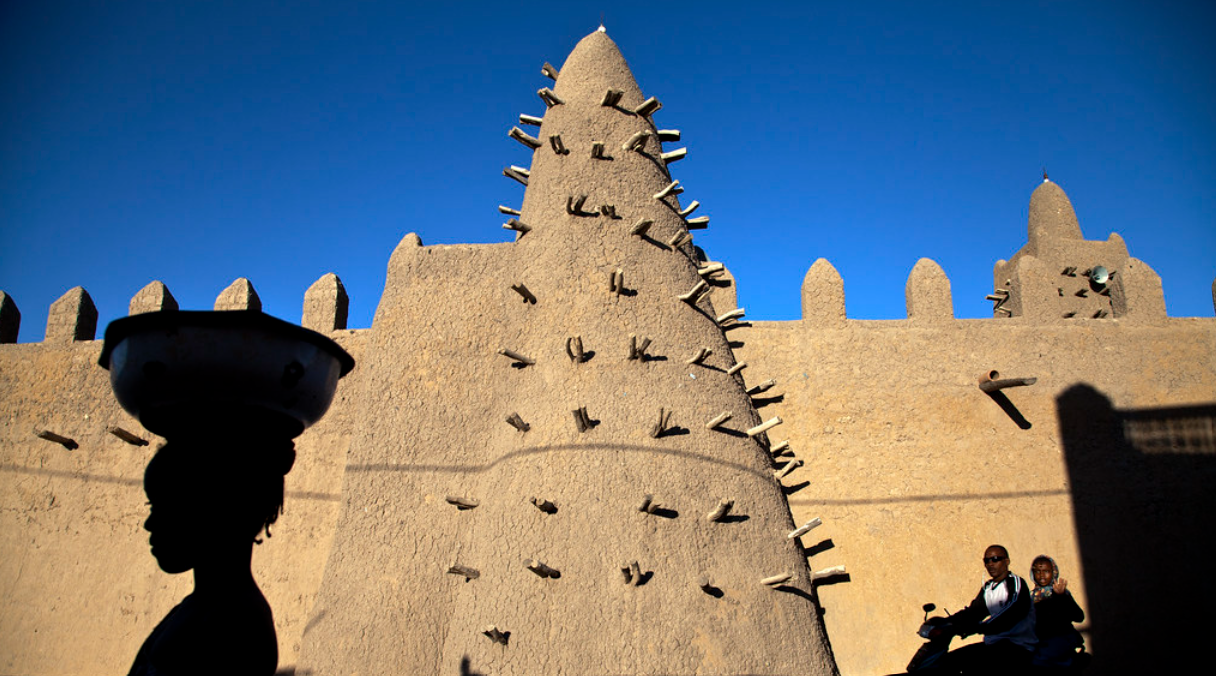
4. Peace & Security Council Meeting
Charting the Path for DDR and Sustaining Peace in Africa: 1245th Peace & Security Council Meeting in Kinshasa, DRC
The African Union Peace and Security Council (PSC) is the AU’s primary body for preventing, managing, and resolving conflicts across the continent. By overseeing peace operations, mediating disputes, and supporting post-conflict recovery, the PSC plays a vital role in sustaining peace. Its focus on early warning, inclusive processes, and partnerships aim to ensure swift, coordinated responses to security challenges. This article explores the recent PSC meeting in Kinshasa, that underscored the role of DDR in strengthening Africa’s resilience and advancing long-term stability.
As Africa faces an increasingly complex and fragmented security landscape, the importance of sustainable peacebuilding initiatives cannot be overstated. At the heart of these efforts lies the crucial nexus between DDR and Post-Conflict Reconstruction and Development (PCRD). These frameworks are not merely technical processes but essential pillars for ensuring peace agreements translate into lasting stability. It is within this critical context that the African Union Peace and Security Council (PSC) convened in Kinshasa, Democratic Republic of Congo (DRC) under the meeting title, “Implementation of DDR and PCRD Programmes for the Consolidation of Peace, Security, and Socio-Economic Activities: Challenges and Way Forward”.
[@AUC_PAPS] On 18 Nov., #PSC held its 1245th meeting in #Kinshasa, to consider the Implementation of the #DDR & #PCRD Programmes for consolidation of peace, security & socio-economic activities in #Africa: Challenges & Way Forward. [1/8]
[@AUC_PAPS] Mtg opened by H.E. Mr. Mbadu Crispin, Minister of Urbanism & Habitat, #DRC on behalf of H.E. Thérèse Kayikwamba Wagner, Minister of State, MoFA, Inter’l Cooperation & Francophonie of the #DRC, #PSC Chairperson of the Month. [2/8]
The AU PSC emphasized the importance of DDR and SSR as a cornerstone for addressing the root causes of conflict, preventing relapse into conflict after a peace agreement and ultimately fostering sustainable peace. MONUSCO, represented by Deputy Special Representative Bruno Lemarquis, contributed to the discussions, highlighting the impact of the Programme de Désarmement, Démobilisation, Relèvement Communautaire et Stabilisation (P-DDRCS) in the DRC. He underlined the value of decentralization, community engagement, and the AU DDR Capacity Program, a partnership between the AU, UN, and World Bank, as critical tools for effective DDR implementation. With support from UNOAU, the meeting showcased the strength of the UN-AU partnership in advancing comprehensive, locally driven DDR solutions aligned with broader socio-economic and political reforms.
The deliberations also underscored the importance of national ownership in DDR programming, emphasizing the need for homegrown strategies that integrate with wider socio-economic and political reforms. Member States were encouraged to establish institutions and frameworks that align DDR efforts with the broader goals of peace, security, and development. A key highlight of the meeting was the endorsement of the Kinshasa DDR Roadmap, which envisions Africa taking the lead in designing context-specific and sustainable DDR strategies. The Roadmap focuses on launching the AU Disarmament Fellowship Program (AUDF) to enhance the capacity of national and regional peace infrastructures and institutions across the continent. The program also aims to conduct in-depth studies at the Member State level and serve as a platform for lessons learned, experience sharing, good practices, and innovations in the implementation of DDR and SSR programs.
Aligning DDR with Broader Peacebuilding Frameworks
Coinciding with the 4th AU PCRD Awareness Week, this meeting’s discussions aligned with the theme: “Charting the Path Forward: Collaborative Strategies for Effective PCRD Policy Implementation.” The PSC reiterated that DDR cannot operate in isolation; it must be embedded within broader peacebuilding frameworks. Such integration is vital for conflict prevention and ensuring that fragile post-conflict gains are consolidated.
[@AUC_PAPS] #PSC welcomed the commemoration of the 4th #AU #PCRD Awareness Week & its 2024 theme of “Charting the Path Forward: Collaborative Strategies for effective #PCRD Policy Implementation”; and encouraged all AU Member States, RECs/RMs, AU Specialized institutions, Civil Society… [3/8]
[@AUC_PAPS] Youth & Women Orgs to redouble efforts in popularising the policy and its nine pillars to ensure its effective implementation to consolidate peace in the Continent; #PSC underlined the importance of successful #DDR and #SSR as critical & integral components for… [4/8]
[@AUC_PAPS] …conflict prevention & peacebuilding efforts & prevention of relapse in Member States emerging from conflict; and encouraged Member States, who have not yet done so, to establish national institutions and structures for #DDR, with significant national ownership & financing… [5/8]
Recognizing Africa’s shifting security dynamics, the suitability of traditional DDR programs, often implemented after comprehensive peace agreements, was brought into question. Reflecting the revised PCRD policy, it was emphasized that modern DDR must address the complexities of fragmented conflicts, the involvement of non-state actors, and transnational challenges. The complexity of implementing DDR in the DRC, with over 120 armed groups, is a stark example of these difficulties. To address the diverse and complex nature of conflicts, tailored solutions are essential, particularly for vulnerable groups such as women, youth, and children. The revised PCRD policy now includes dedicated pillars on youth and women, underscoring the AU’s commitment to inclusive peacebuilding.
[@AUC_PAPS] …and ensure that broader economic, political, and social reforms in line with the nexus between peace, security & dev’t approach. #PSC endorsed the ‘#Kinshasa #DDR Roadmap’ focusing on: Launching the AU Disarmament Fellowship Programme (AUDF) to enhance capacity of…[6/8]
[@AUC_PAPS] …national and regional peace infrastructures and institutions on the continent; and Conduct in-depth study at Member State level and serve as a platform of lessons learned, experience sharing, good practices and innovations on the implementation of the Disarmament… [7/8]
[@AUC_PAPS] …Demobilization, and Reintegration and Security Sector Reform programmes; among other things. [8/8]
A Call to Action and the Way Forward
The meeting concluded with a resounding call to action: DDR and PCRD must move beyond theoretical frameworks to deliver tangible results. The PSC’s decision to convene an annual high-level meeting in Kinshasa during PCRD Awareness Week reflects its commitment to turning lessons into actionable strategies. These efforts, coupled with the Kinshasa DDR Roadmap, represent a significant step in Africa’s quest for sustained peace and stability.
The energy and resolve of the Kinshasa meeting underscore the growing momentum for peacebuilding across the continent, symbolizing a collective effort to address the continents’ peace and security challenges.
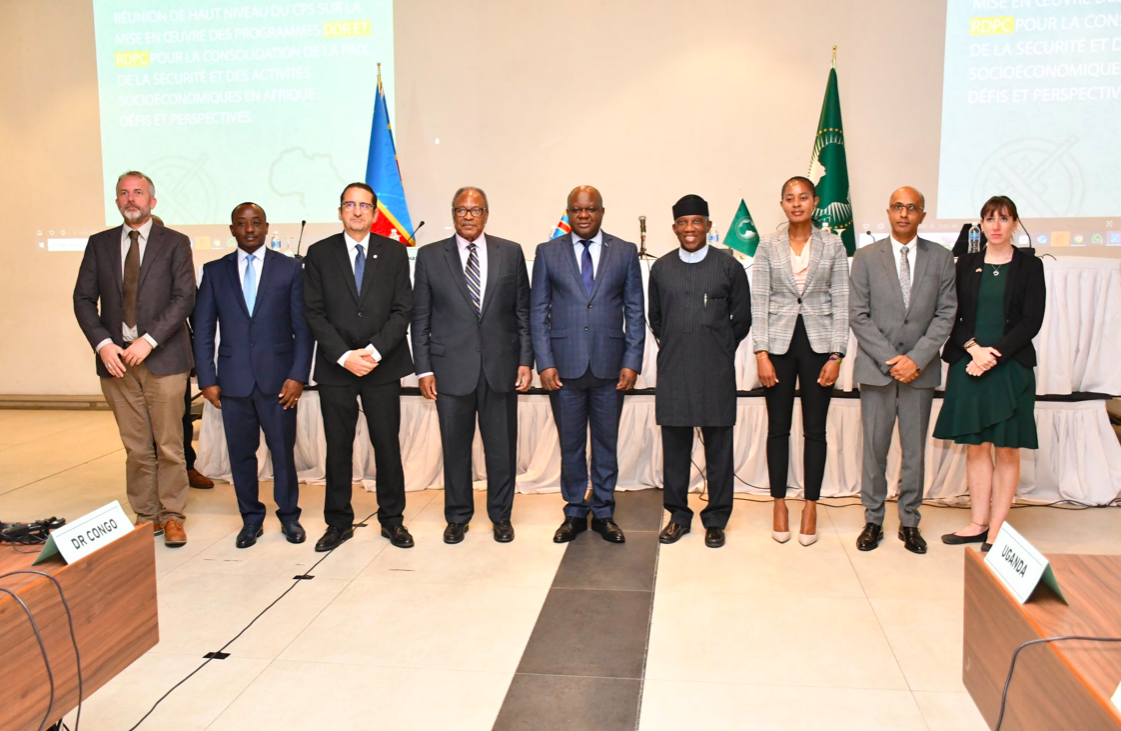
5. DDR & Political Transformation of Armed groups
Transforming Armed Groups: The Role of DDR in Political Participation
Violence by many non-state armed groups is driven by grievances related to political participation. Research has found that their inclusion into the political arena generally has a positive effect on sustainable peace after armed conflicts. Such a transformation—from armed movements to political entities— entails the organizational shifts from military-type irregular forces to unarmed civilian structures. This process is known as the political transformation of armed groups. DDR serves as a cornerstone for this political transformation, but its success depends on addressing political, social, and civic dimensions. Past political transformation processes took diverse avenues hinging on a set of internal and external factors, while always being complex and long-term.
The Berghof Foundation has partnered with the DDR Section to explore the intricate relationship between DDR and the political transformation of armed groups. Building on the recognition of the interdependence of the two processes, the partnership aims to operationalize support for political transformation by providing guidance for peace mediators, DDR and peacebuilding practitioners. To achieve this, the initiative implements support activities for non-state, state, and third-party actors in transitional or post-war contexts, with two objectives:
1. Provide direct support to DDR and political transformation processes.
2. Distill lessons to create concrete guidance on crucial elements of political transformation that need to be included and reflected in DDR processes.
Civic Education: Laying the Foundations for Leadership
Members of armed groups fulfill a variety of functions during conflict – as commanders, fighters, or in non-combatant roles. However, combatants often aspire to play different roles in a post-conflict society. Particularly rank-and-file combatants often seek to serve their communities and contribute to peacebuilding. One crucial element of DDR programs is therefore providing former combatants with the tools to engage meaningfully in governance and peacebuilding processes. This involves equipping them with knowledge and skills to (re)establish themselves as full citizens, conscious of their political and social rights and responsibilities, and capable of pursuing their political aspirations peacefully.
A workshop held in April 2024 in Asosa, Ethiopia, convened ex-combatants, local government officials, and civil society to develop programs that position former fighters as peacebuilding agents within their communities. By focusing on civic education and mediation skills, the initiative highlighted how DDR can serve as a catalyst for political engagement and conflict resolution.
Workshop in Asosa, Benishangul Gumuz Region (BGR) in Ethiopia with representatives of the regional government, civil society and ex-combatant representatives to jointly work towards a program on how ex-combatants can be engaged as peacebuilding agents in their communities through political and civic education. The workshop took place on 30 April 2024.
Gender and Political Inclusion
In many parts of the world, women face unique challenges in accessing political spaces due to their systematic exclusion from formal political participation through political parties. This includes female combatants, who, just like their male counterparts, often join non-state armed groups due to political grievances and aspirations for political agency.
A November 2024 workshop brought together the Bangsamoro Islamic Women Auxiliary Brigade (BIWAB), the women’s sector of the Bangsamoro Armed Forces (BIAF), and the League of Moro Women Organisation (LMWOI), a civil society group formed by women ex-combatants to support their transition to civilian life and advocate for political agency. The workshop provided a platform for these women to amplify their advocacy and explore pathways for meaningful participation in political and peace processes.
By addressing patriarchal barriers and equipping women with leadership skills, this initiative underscored the importance of gender-sensitive DDR programming. It also explored ways for women to become leaders and participate in the political arena, challenging the persistence of patriarchal power structures.
Workshop with the BIWAB and LMWOI to provide a safe space for the women former combatants to discuss the possible entry points for meaningful participation in peace and political processes. The workshop took place on 13-15 November 2024 and was conducted in cooperation with the Folke Bernadotte Academy (FBA).
Lessons Learned and Ways Forward
These workstreams demonstrate how DDR can extend beyond the immediate cessation of conflict to address the long-term political reintegration of ex-combatants. By fostering civic education, promoting inclusive mediation, and empowering marginalized groups, DDR lays the groundwork for sustainable governance and peace.
Contribution by Johanna-Maria Hülzer, Berghof Foundation
6. Reflections from Mali
One Year After MINUSMA’s Withdrawal: Looking back at CVR Projects in Mali
From 2013 to 2023 the DDR Team in the United Nations Multidimensional Integrated Stabilization Mission in Mali (MINUSMA) implemented 231 Community Violence Reduction (CVR) projects, reaching a total of 358,647 direct beneficiaries. Of these, 187,068 (52.2%) were women.
The majority of projects were implemented in four regions of the country: Gao, Kidal, Mopti and Timbuktu. These projects created short-term employment, providing both skills training and income to youth at risk of recruitment by armed groups as well as community members. Most projects focused on rehabilitating public infrastructure, such as water supply systems and livestock facilities, as well as aiding the agricultural development of the communities, providing added benefits to the communities in which they were located.
The following map presents key information on the projects implemented in the four regions, such as the number of projects per fiscal year and the type of projects. Additionally, the trends in violent episodes during the period the mission was active in Mali are depicted to allow for a comparison with the trends in CVR project implementation in the different regions, without implying causation.
This map intends to bring attention to the astounding work performed by the MINUSMA staff. For further information on the mission and its work, we invite you to watch the documentary Doves in Zero Gravity with the trailer available here.
7. Field Updates
Burkina Faso
From 8 to 11 October, the DDR Section supported a workshop convened by the Liptako-Gourma Authority to create the action plan for the Regional Strategy for Stabilization, Resilience, and Recovery. The workshop marked a key step in advancing regional efforts to address challenges in stabilization and recovery across the Liptako-Gourma region. DDR Section also discussed separately with the RCO and the LGA next steps in the support on DDR-related issues.
Central African Republic
Progress in the Political Agreement for Peace and Reconciliation in the Central African Republic (APPR) includes the dissolution of six armed groups and the disarmament of their combatants. The UN Security Council’s decision to lift the arms embargo in July 2024 and the Kimberley Process’s removal of the diamond ban in November 2024 signal further progress. Additionally, MINUSCA’s mandate renewal by the Security Council on 14 November 2024 confirms strong international support.
MINUSCA DDRS efforts have been focused on re-engaging groups within the Coalition of Patriots for Change (CPC) in the National DDR Program and addressing gaps in the reintegration program caused by the conclusion of World Bank funding. Despite progress of the APPR recent increases in parallel disarmament operations conducted by FACA and OSP continues to undermine the national DDRR program (PNDDRR), as eligible combatants become technically ineligible due to the handing over to the OSP the military-grade weapons required for DDR participation. MINUSCA has been actively engaging at the highest political levels to address this issue, but risks remain.
Colombia
From 27 November to 2 December, delegates from the DRC, Cameroon, Nigeria, and the Philippines conducted a technical mission to Columbia to share experiences and advance cooperation on DDR and Transitional Justice.
Democratic Republic of the Congo
On 1 October 2024, the United Nations Group of Friends of DDR convened to discuss accelerating the operationalization of the P-DDRCS. The program, now under the direct supervision of the DRC President, represents a significant shift toward a community-centered approach, prioritizing conflict resolution, community recovery, and stabilization through innovative strategies like mobile DDR and infrastructure projects.
Despite challenges, including ongoing conflict in the eastern regions and resource constraints, progress has been made, with over 1,600 adults and 4,000 children demobilized since the operationalization of the P-DDRCS. MONUSCO continues to play a critical role in advancing DDR efforts, particularly through support for community violence reduction and reintegration programs. Member States reaffirmed their commitment to the DRC’s peacebuilding process, emphasizing the importance of sustained collaboration and resource mobilization.
Ghana
From 11 to 15 November, the DDR Section and the Office for Disarmament Affairs (ODA), in collaboration with UNITAR, the Folke Bernadotte Academy (FBA), and the Ammunition Management Advisory Team (AMAT), successfully conducted the 2024 edition of the “Effective Weapons and Ammunition Management (WAM) in a Changing DDR Context” training course. Hosted at the Kofi Annan International Peacekeeping Training Centre (KAIPTC) in Accra, the course provided DDR practitioners with essential knowledge and skills to design, plan, and implement innovative WAM initiatives in increasingly complex DDR settings.
The training is part of a broader initiative led by DPO and ODA, funded by the German Federal Foreign Office, which offers expert guidance, training, and technical assistance to support tailored WAM activities linked to DDR processes.
(See Images Below, learn more about the training here.)
Great Lakes Region
In November, DDRS supported a three-day technical workshop in Burundi with the Contact and Coordination Group Operational Cell (CCG Ops Cell), held against the backdrop of the first wave of repatriation of Burundian combatants from the Forces Nationales de Libération (FNL) in the DRC.
From 10 to 12 December in Bujumbura, DDRS and its Standing Capacity supported the Office of the Special Envoy of the Secretary-General for the Great Lakes Region, alongside the Folke Bernadotte Academy (FBA), with participation from IOM, PBSO, and UNDP, in facilitating a workshop to develop a legal and operational framework for the reintegration of Burundian former combatants and their dependents. The workshop focused on standardized procedures and the roles of Burundian authorities in demobilization, registration, and socio-economic support. Burundian authorities reaffirmed their commitment to ensuring their sustainable reintegration.
Haiti
As of 20 November, following a recent escalation in gang attacks, BINUH has initiated the evacuation of staff. The sole DDRS international staff member has been relocated to the Dominican Republic, while all national staff have been accounted for and confirmed safe.
Lake Chad Basin
On 29 October, the DDR Section, together with co-organizers of the regional DDR workshop held in Bamako in April (EMP, FBA, UNDP, IOM, and BICC), convened a two-hour webinar to follow up on the workshop’s recommendations. Participants included representatives from DDR commissions and civil society, including youth and women’s groups, from six regional countries — Mali, Niger, Burkina Faso, Chad, Cameroon, and Nigeria — as well as the Liptako-Gourma Authority and the Lake Chad Basin Commission.
Approximately 30 participants exchanged updates on ongoing DDR initiatives, operational approaches, and activities. Participants also expressed their commitment to maintaining quarterly meetings to foster continued collaboration and knowledge-sharing across the region.
From 18 to 20 November, a Policy Forum on “Regional Approaches to Dealing with Armed Groups in the Sahel” in Addis Ababa was organized by BICC in collaboration with DDRS and the African Union. The forum facilitated in-depth discussions on conflict dynamics and strategies to address the challenges posed by non-state armed groups in the region.
League of Arab States
From 1 to 3 October, the DDR Section, in partnership with the FBA, successfully conducted a workshop in Cairo for Member States of the LAS on DDR-related issues. The event saw active participation from 14 out of 22 Member States, with delegations from Algeria, Iraq, Libya, Morocco, Saudi Arabia, Somalia, Syria, and Yemen (Aden) attending.
The workshop marked a significant step in advancing collaboration with LAS. In the short-to-medium term, the focus will be on establishing an inter-departmental DDR Task Force within LAS and initiating the development of a policy or vision document on DDR. The workshop also resulted in the creation of a roadmap to guide future DDR efforts in the region.
The workshop was made possible with support from the United Nations Liaison Office to the LAS.
Libya
From 22 to 24 October, UNSMIL held a workshop in Tripoli with local communities on developing a pilot CVR programe for the region of Ubari. The workshop brought together community, youth, and women leaders, as well as civil society organizations from Ubari and other parts of Libya. Representatives from the Ministries of Defence, Local Government, Labor, Youth, Tourism, and Traditional Industry also participated. The discussions aimed to advance workshop recommendations and design a CVR roadmap for Ubari, to be implemented in the coming year with partner support. DDR Standing Capacity supported the workshop.
Following this, from 21 to 23 November, a workshop on CVR was held in Tripoli with three key objectives: assessing the root causes of violence and recruitment drivers in Ubari Municipality, identifying appropriate responses, and designing locally-led solutions for CVR.
Philippines
From 11 to 17 November, the Berghof Foundation conducted two on-site activities in the Philippines as part of a joint project with the DDRS on the politics of DDR. These included workshops with the Local Monitoring Working Group on Implementation (LMWOI) and Bangsamoro Islamic Women Auxiliary Brigade (BIWAB), as well as a peer exchange. Representatives of peace mechanisms under the Moro Islamic Liberation Front’s (MILF) normalization track engaged with counterparts from Aceh, the Basque Country, Patani (Southern Thailand), and Timor-Leste to exchange experiences and lessons learned.
South Sudan
Following the successful completion of two CVR pilot projects in June in Western Bahr el Ghazal, UNMISS convened two high-level consultations in December, bringing together national and international partners to explore pathways for scaling up CVR efforts across South Sudan. These discussions reflect growing momentum to address violence reduction and lay the groundwork for sustainable peace.
Inter-Agency Working Group (IAWG)
On 10 October, during its quarterly meeting, the IAWG officially adopted the DDR Pledge. Members committed to furthering discussions on the pledge’s implementation and operationalization to enhance collaboration and coordination in DDR efforts globally.
The Regional Centre on Small Arms in the Great Lakes Region, the Horn of Africa and Bordering States (RECSA)
On 18 November 2024, the DDR Section, in partnership with the Office for Disarmament Affairs (ODA), supported the Regional Centre on Small Arms (RECSA) during a validation workshop for the regional roadmap on Weapons and Ammunition Management (WAM) in DDR contexts. The workshop marked the culmination of months of collaboration, including two regional roundtables and extensive technical support throughout the drafting process.
Representatives from 12 RECSA Member States — Burundi, Central African Republic, Democratic Republic of Congo, Djibouti, Eritrea, Ethiopia, Kenya, Rwanda, Tanzania, Uganda, Somalia, and South Sudan — successfully validated the roadmap and committed to its implementation.
The next steps will focus on operationalizing the roadmap to ensure its practical application and measurable impact across the region.
8. Recent Publications
DPO/DDRS:
White Paper: DDR &
Armed Groups Designated as Terrorist
Organizations (AGDTO)
The present document aims to outline common understanding within the DDR Section on the implementation of integrated DDR processes that target armed groups designated as terrorist organizations (AGDTO). By considering a wide range of international instruments, the paper fosters complementarity across interventions and between judicial and non-judicial efforts. The document should be used as reference when engaging key stakeholders on issues related to DDR and AGDTO.
DPO/DDRS:
Policy Note: Perspectives from DDR
on the Peace Building Architecture Review (PBAR)
This policy note examines the evolving role of Disarmament, Demobilization, and Reintegration (DDR) within the Peacebuilding Architecture Review (PBAR). It highlights how DDR contributes to peacebuilding by addressing armed violence, fostering social cohesion, and supporting sustainable reintegration. Drawing from recent insights and practices, the note emphasizes the need for adaptable, inclusive DDR strategies aligned with peacebuilding priorities, particularly in fragile and conflict-affected settings. It offers recommendations to strengthen DDR’s integration into broader peacebuilding frameworks, ensuring its effectiveness in addressing the complexities of modern conflicts.
AU:
African Union Journal on Post-Conflict Reconstruction and Development: Peacebuilding @ Work
The inaugural edition of the African Union Journal on Post-Conflict Reconstruction and Development explores key themes in peacebuilding and post-conflict recovery, including violent extremism, the role of youth and women, and the intricate links between peace, security, and development. Produced by the Department of Political Affairs, Peace and Security of the African Union Commission, and supported by the Training for Peace (TfP) project and ISS, this peer-reviewed journal fosters critical dialogue, policy analysis, and innovative thinking to advance PCRD efforts across Africa, aligning with Agenda 2063’s vision for a peaceful and secure continent.
MEAC:
Survival and Struggle: The Experience of Women and Girls With and After Boko Haram
This report examines the reintegration experiences of women and girls formerly associated with Boko Haram in Cameroon, Chad, and Nigeria. Based on qualitative research and surveys conducted in 2024, it provides insights from interviews and focus groups across the Far North region of Cameroon, the Lac Region of Chad, and Northeast Nigeria. The findings highlight the unique challenges faced by women and girls and emphasize the need for gender-sensitive prevention and reintegration programming to address their specific needs more effectively.
MEAC:
Sexual Violence and the Struggle for Justice: The Involvement of Indigenous Nasa Survivors in Armed Groups in Northern Cauca
This report explores the link between sexual violence and recruitment into armed groups among the Nasa Indigenous community in North Cauca, Colombia. Based on interviews and focus groups with community leaders and the Indigenous Guard, it highlights how survivors often join armed groups seeking justice due to systemic barriers and inadequate local accountability mechanisms. In collaboration with ACIN, the report provides gender-sensitive recommendations for conflict prevention and reintegration, including improved policies, survivor support services, and efforts to address unequal gender norms.
MEAC:
Picturing Conflict: Child Perspectives from Their Time with Boko Haram and Their Exit Journeys
This report highlights the voices of children formerly associated with Boko Haram in Northeast Nigeria, sharing their entry and exit journeys, post-exit needs, and aspirations. It draws on participatory photography and action research with 16 conflict-affected children, as well as focus groups and a 3,640-person survey conducted in 2024. The report aims to ensure the perspectives of these children are reflected in policies and programs that support their reintegration into civilian life, accompanied by a powerful photography series and video.
MEAC:
Shifting the Focus: Insights from Conflict-affected Children and Youth on Peacebuilding and Recovery
Shifting the Focus explores a participatory photography and research program run in 2024 with conflict-affected children and youth in Nigeria, Iraq, and Colombia. Conducted by UNIDIR’s MEAC project, 100cameras, War Child, UNICEF, and local partners, the program equipped participants with photography and research skills, creating a space for them to process their experiences and build support networks. The report highlights the program’s implementation, participant insights, and lessons learned, serving as a resource for policymakers and practitioners aiming to adopt youth-centered approaches in conflict-affected settings.
ACLED:
Newly restructured, the Islamic State in the Sahel aims for regional expansion
The analysis in this report draws on ACLED data and observations of militant propaganda material provided to ACLED by MENASTREAM, a data partner. The author has also drawn additional information from ad hoc research and non-open-source reports from local sources/networks that have asked to remain anonymous.
RESOLVE NETWORK:
Youth, Social and Behavioral Change, and Violent Extremism in Niger
In 2022, NDI launched a pilot program in Abala, Niger, integrating youth-led approaches and behavioral science to prevent and counter violent extremism (P/CVE). The initiative empowered rural youth to address intersectional risks of violent extremism in their communities, emphasizing gender dynamics and youth leadership. Partnering with Beyond Conflict and SOS Civisme, the program incorporated social and behavioral change (SBC) research, using tools like radio programming and community dialogues to challenge stereotypes and promote youth inclusion in decision-making. This policy note highlights lessons and recommendations for leveraging behavioral science in P/CVE for more sustainable outcomes.
ACLED:
Conflict Watchlist 2025
In ACLED’s Conflict Watchlist, we identify 10 crisis areas that are likely to evolve in the coming year, both for better and for worse. The Watchlist goes beyond showcasing violent hotspots and instead offers a view into some of the world’s most complex crises. As we enter 2025, there is no shortage of intractable conflicts to choose from. But in our selection, we highlight those that represent the more general trends we are seeing from ACLED’s Conflict Index.
IPI:
Challenging the Invisibility of Women Combatants: Five Steps Towards Gender-Responsive DDR
This article challenges the invisibility of women combatants in Disarmament, Demobilization, and Reintegration (DDR) processes and offers five actionable steps for making DDR more gender-responsive. By addressing biases and ensuring that the unique needs of women combatants are considered, the piece underscores the importance of inclusive approaches in achieving sustainable peace. It highlights practical recommendations to integrate gender perspectives into DDR programming and policy, fostering more equitable and effective reintegration outcomes.
IPI:
Enhancing Women’s Meaningful Involvement in Reintegration: Lessons from Cameroon
This article explores innovative approaches to strengthening women’s involvement in reintegration processes, drawing from practical lessons in Cameroon. It highlights the importance of gender-sensitive strategies in fostering sustainable reintegration and community resilience. Through case studies and field insights, the piece underscores the value of inclusive frameworks that address the unique challenges faced by women in post-conflict settings. A must-read for practitioners and policymakers working on gender-responsive peacebuilding initiatives.
9. Upcoming Events and Trainings
Film Screening & Discussion with Combatants for Peace (IPI)
30. January 2025, 4-6PM in New York City, USA
The DDR Section will co-host with the International Peace Institute (IPI), and with support from the Berghof Foundation, a film screening of “there is Another Way” which tells the story of Israeli and Palestinian ex-combatants pursuing a non violent path as part of a grassroots peace-building movement named “Combatants for Peace”. The event will include a panel with members of the group.
Stay tuned for Updates: Further details about upcoming screening will be provided soon. Please continue to monitor the IPI Events website for the latest updates and announcements.
DDR Foundation Course (KAIPTC)
24. – 28. March 2025 in Accra, Ghana
Through building individual skills, the course aims at enhancing the capacity and effectiveness of UN, Regional Economic Communities, other institutions to perform peace operations by providing participants with a comprehensive, conceptual and operational level understanding of the principles, procedures and up to date practices involved in the planning, coordination and conduct of DDR programs and DDR related tools, properly reflecting new developments involved in the field of DDR. .
SSR/DDR Training Course (IPSTC)
05. – 16. May 2025 in Nairobi, Kenya
Stay tuned for Updates: Further details about upcoming courses will be provided soon. Please continue to monitor the Events and Trainings website for the latest updates and announcements.
CVR Global Course
y
19. – 23. May in Stans, Switzerland
Stay tuned for Updates: Further details about upcoming courses will be provided soon. Please continue to monitor the Events and Trainings website for the latest updates and announcements.
This edition was edited by Thara Weiss.
